US election: Clinton set to cement hold on nomination
- Published
Hillary Clinton "I got to tell you according to the news we are on the brink of a historic unprecedented moment"
Hillary Clinton is hoping to claim victory in the race for the Democratic presidential nomination after six states have finished holding primaries.
The Associated Press says Mrs Clinton has already reached the 2,383 delegates needed, taking into account pledges of support from so-called superdelegates.
She looks set to win New Jersey but the race could be tighter in the other big prize state, California.
Rival Bernie Sanders insists it is too early to call the result.
Meanwhile, the Republican's nominee, Donald Trump, has been accused by the party's house speaker of making the "textbook definition of racist comments" about a US-Mexican judge.

Where are the primaries taking place?
Voting is taking place in Montana (27 delegates), New Mexico (43) and South Dakota (25), with a caucus in North Dakota (23). California has 543 delegates and New Jersey 142.
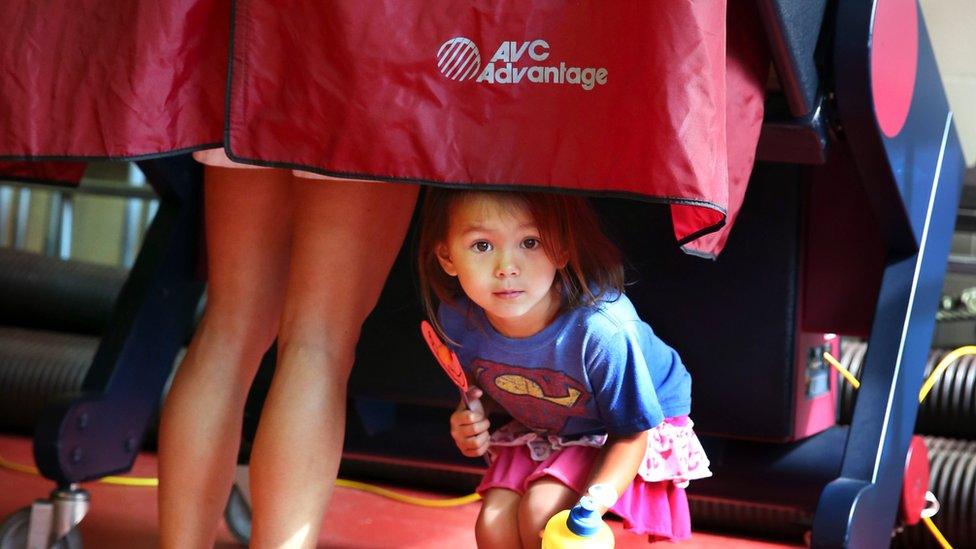
New Jersey was the first state to begin voting
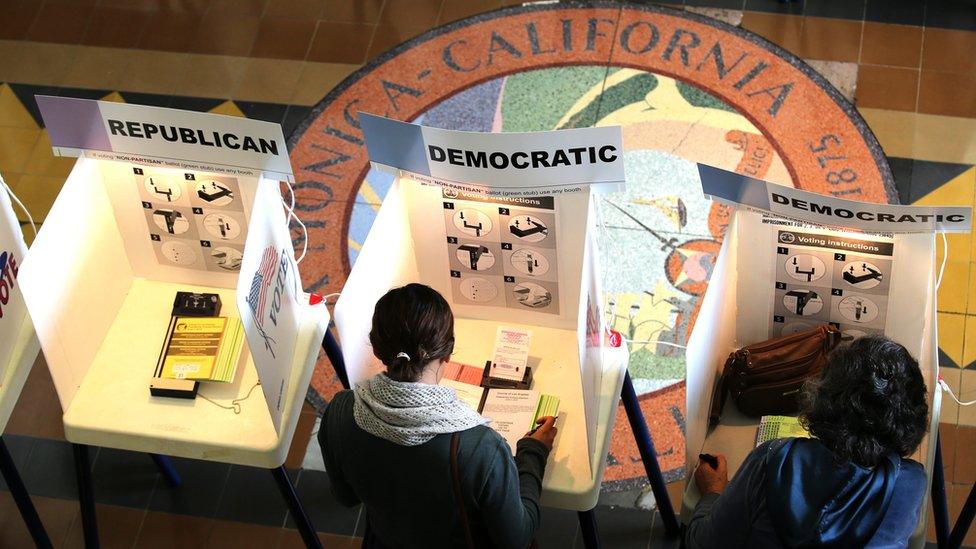
California has the most Democratic delegates up for grabs - a total of 543
Republicans are also voting in the same states, except North Dakota, although the result is meaningless as Mr Trump has already secured the party's nomination.
The final Democratic primary is in Washington DC on 14 June. It has 45 delegates.

Are we sure Hillary Clinton has clinched the nomination?
The Associated Press says its count has Mrs Clinton on 1,812 pledged delegates and 571 superdelegates.
US media organisations say this means she will now become the first female nominee for a major US political party.

Superdelegates are party insiders who can pledge their support for a candidate ahead of the convention but do not formally vote for them until the convention itself in late July.
They can change their mind before the convention, but the AP says its tally includes only those who are unequivocal in their support for her.
Mrs Clinton received another boost on Tuesday when the influential Democratic politician and House Minority Leader Nancy Pelosi endorsed her for president.

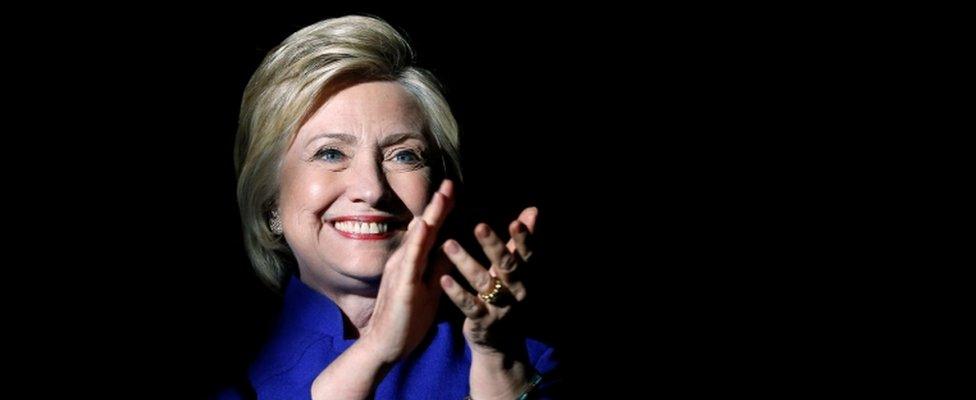
Why don't I feel more excited? Analysis by Katty Kay, BBC World News America
It has taken 227 years to get even this far.
George Washington was elected president of a newly independent America in 1789. Forty-two men later (41 of them white) Hillary Clinton makes history today by being the first female nominee for the White House.
So why don't I feel more excited?
The lack of exuberance may come from the fact that this has all been going on for so long.
We've really been reworking a version of the "first viable female candidate for the presidency" story since 20 January 2007, the first time Hillary Clinton declared her candidacy for the White House.
We're exhausted. We've run out of superlatives. We've overused every anecdote from the former first lady, former senator, former secretary's well-covered life.
A woman president would be new, Hillary Clinton is not.

What has been Clinton and Sanders' response?
Mrs Clinton did not claim victory after the AP announcement, telling supporters in Long Beach, California, on Monday: "We are on the brink of a historic and unprecedented moment but we still have work to do.
"We have six elections tomorrow and we're going to fight hard for every single vote, especially right here in California."
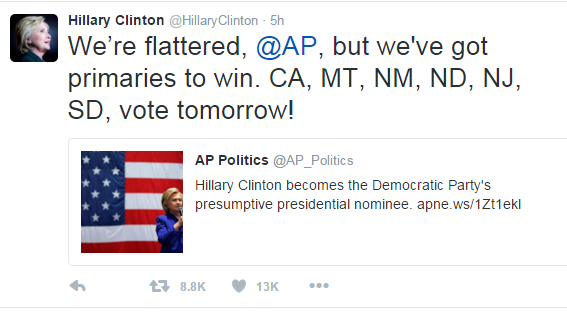
Bernie Sanders is hoping for a victory in California to keep his campaign going to the party convention.
The Vermont senator has commanded huge crowds at his rallies, many of them younger voters, pledging action on income inequality, minimum wages and student tuition fees.
Sanders team spokesman Michael Briggs said the media "is wrong to count the votes of superdelegates before they actually vote at the convention this summer."
He said Mr Sanders would attempt to win back superdelegates.
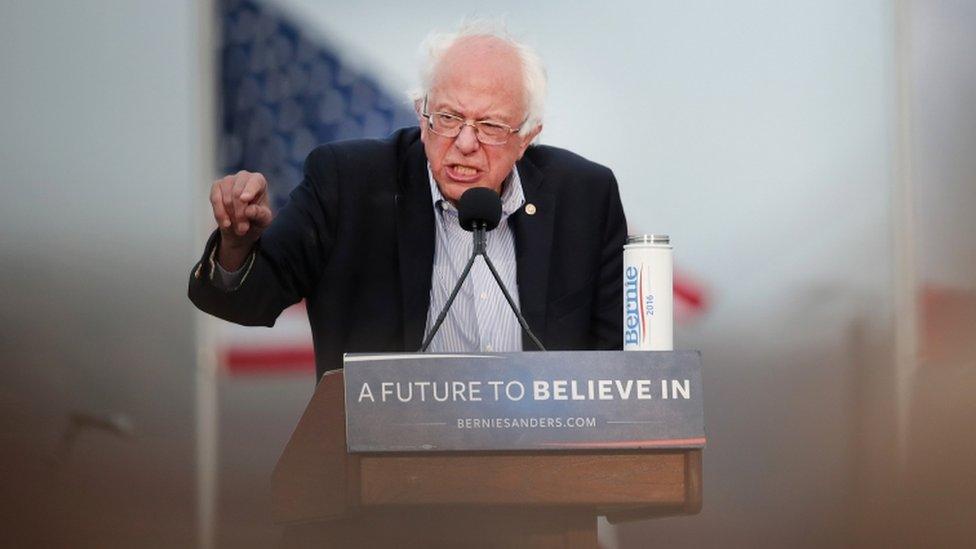
Bernie Sanders hopes California will propel him to a party convention showdown
But the BBC's Anthony Zurcher says Mr Sanders has been running an anti-establishment campaign that has not generated much enthusiasm among the Democratic power players and party stalwarts who comprise the bulk of the superdelegates.
AP reports White House officials as saying that Mr Obama is preparing to endorse Mrs Clinton in the next few days, although the announcement would come after Tuesday's primaries.
Mr Obama telephoned Mr Sanders on Sunday, AP said. The contents of the call have not been revealed.
And in the Republican camp?
Donald Trump has faced a barrage of criticism from within the Republican Party this week over his comments that Mexican-American US District Judge Gonzalo Curiel was biased against him.
Paul Ryan, the Republican house speaker, did not pull any punches. He said: "Claiming a person can't do their job because of their race is sort of like the textbook definition of a racist comment".
Mr Trump, who wants to build a wall between Mexico and the US, has since said his comments were misconstrued. He said it was fair to question Judge Curiel's impartiality in a civil suit against Trump University, but it was not a broader attack on people of Mexican heritage.